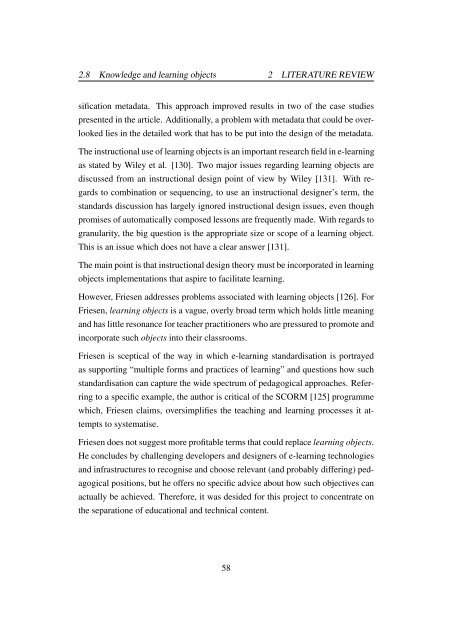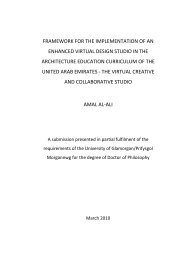- Page 1 and 2:
Separation of educational and techn
- Page 3 and 4:
CONTENTS CONTENTS Contents 1 Introd
- Page 5 and 6:
CONTENTS CONTENTS 2.12.6 Java and J
- Page 7 and 8: CONTENTS CONTENTS 6 Interview evalu
- Page 9 and 10: CONTENTS CONTENTS 7.3.5 Presentatio
- Page 11 and 12: LIST OF FIGURES LIST OF FIGURES Lis
- Page 13 and 14: LIST OF TABLES LIST OF TABLES List
- Page 15 and 16: List of Abbreviations ADL - Advance
- Page 17 and 18: Declaration This work has not previ
- Page 19 and 20: 1 Introduction 1.1 Aim of project 1
- Page 21 and 22: 1.4 Problem areas 1 INTRODUCTION ea
- Page 23 and 24: 1.5 Approach 1 INTRODUCTION Secondl
- Page 25 and 26: 2 Literature Review 2 LITERATURE RE
- Page 27 and 28: 2.1 Definition and history of e-lea
- Page 29 and 30: 2.2 Forms of e-learning 2 LITERATUR
- Page 31 and 32: 2.2 Forms of e-learning 2 LITERATUR
- Page 33 and 34: 2.2 Forms of e-learning 2 LITERATUR
- Page 35 and 36: 2.2 Forms of e-learning 2 LITERATUR
- Page 37 and 38: 2.2 Forms of e-learning 2 LITERATUR
- Page 39 and 40: 2.3 Advantages and disadvantages of
- Page 41 and 42: 2.4 Pedagogical elements and approa
- Page 43 and 44: 2.4 Pedagogical elements and approa
- Page 45 and 46: 2.5 Educational research 2 LITERATU
- Page 47 and 48: 2.6 Teaching and learning strategie
- Page 49 and 50: 2.6 Teaching and learning strategie
- Page 51 and 52: 2.6 Teaching and learning strategie
- Page 53 and 54: 2.7 E-learning and meta-data projec
- Page 55 and 56: 2.7 E-learning and meta-data projec
- Page 57: 2.8 Knowledge and learning objects
- Page 61 and 62: 2.9 Project management and e-learni
- Page 63 and 64: 2.10 Reuse of material 2 LITERATURE
- Page 65 and 66: 2.11 Adaptive Hypermedia System 2 L
- Page 67 and 68: 2.11 Adaptive Hypermedia System 2 L
- Page 69 and 70: 2.12 Technology 2 LITERATURE REVIEW
- Page 71 and 72: 2.12 Technology 2 LITERATURE REVIEW
- Page 73 and 74: 2.13 Research objectives 2 LITERATU
- Page 75 and 76: 3.1 Theoretical approach 3 EFTECS p
- Page 77 and 78: 3.1 Theoretical approach 3 EFTECS A
- Page 79 and 80: 3.2 EFTECS at EM-Layer 3 EFTECS mat
- Page 81 and 82: 3.3 EFTECS at TLS-Layer 3 EFTECS
- Page 83 and 84: 3.3 EFTECS at TLS-Layer 3 EFTECS Fo
- Page 85 and 86: 3.4 EFTECS at EHP-Layer 3 EFTECS 3.
- Page 87 and 88: 3.4 EFTECS at EHP-Layer 3 EFTECS 3.
- Page 89 and 90: 3.6 Common meta-information 3 EFTEC
- Page 91 and 92: 3.8 The complete EFTECS 3 EFTECS 3.
- Page 93 and 94: 3.9 The eXtensible Educational Mark
- Page 95 and 96: 4.1 General approach 4 HEAT 4.1.1 T
- Page 97 and 98: 4.1 General approach 4 HEAT the dif
- Page 99 and 100: 4.2 EHP-Layer 4 HEAT 4.2.2 Technica
- Page 101 and 102: 4.3 EHP-Information 4 HEAT 4.3 EHP-
- Page 103 and 104: 4.4 TLS-Layer 4 HEAT 4.4 TLS-Layer
- Page 105 and 106: 4.4 TLS-Layer 4 HEAT Element Type x
- Page 107 and 108: 4.5 EM-Layer 4 HEAT The important f
- Page 109 and 110:
4.6 Content space 4 HEAT It was def
- Page 111 and 112:
4.7 Material delivery 4 HEAT concep
- Page 113 and 114:
4.8 Detailed example 4 HEAT • Add
- Page 115 and 116:
4.8 Detailed example 4 HEAT Figure
- Page 117 and 118:
4.8 Detailed example 4 HEAT Figure
- Page 119 and 120:
4.8 Detailed example 4 HEAT Figure
- Page 121 and 122:
4.8 Detailed example 4 HEAT Figure
- Page 123 and 124:
4.8 Detailed example 4 HEAT Figure
- Page 125 and 126:
4.8 Detailed example 4 HEAT the aut
- Page 127 and 128:
5 Evaluation methodology 5 EVALUATI
- Page 129 and 130:
5.1 Analysis of alternative approac
- Page 131 and 132:
5.2 Design of the interview evaluat
- Page 133 and 134:
5.2 Design of the interview evaluat
- Page 135 and 136:
5.2 Design of the interview evaluat
- Page 137 and 138:
5.2 Design of the interview evaluat
- Page 139 and 140:
5.2 Design of the interview evaluat
- Page 141 and 142:
5.2 Design of the interview evaluat
- Page 143 and 144:
5.3 Design of the practical evaluat
- Page 145 and 146:
6 Interview evaluation 6 INTERVIEW
- Page 147 and 148:
6.1 Analysis of the pre-test interv
- Page 149 and 150:
6.1 Analysis of the pre-test interv
- Page 151 and 152:
6.2 Analysis of the manual markup t
- Page 153 and 154:
6.3 Analysis of the mid-test interv
- Page 155 and 156:
6.3 Analysis of the mid-test interv
- Page 157 and 158:
6.4 Analysis of the HEAT based mark
- Page 159 and 160:
6.4 Analysis of the HEAT based mark
- Page 161 and 162:
6.5 Analysis of the post-test inter
- Page 163 and 164:
6.5 Analysis of the post-test inter
- Page 165 and 166:
7 Practical evaluation 7 PRACTICAL
- Page 167 and 168:
7.1 Design 7 PRACTICAL EVALUATION O
- Page 169 and 170:
7.2 Existing material 7 PRACTICAL E
- Page 171 and 172:
7.2 Existing material 7 PRACTICAL E
- Page 173 and 174:
7.3 New material 7 PRACTICAL EVALUA
- Page 175 and 176:
7.3 New material 7 PRACTICAL EVALUA
- Page 177 and 178:
7.4 Summary 7 PRACTICAL EVALUATION
- Page 179 and 180:
7.4 Summary 7 PRACTICAL EVALUATION
- Page 181 and 182:
8 Discussion 8 DISCUSSION The insig
- Page 183 and 184:
8.1 Review of the EFTECS 8 DISCUSSI
- Page 185 and 186:
8.1 Review of the EFTECS 8 DISCUSSI
- Page 187 and 188:
8.2 Review of the HEAT 8 DISCUSSION
- Page 189 and 190:
8.2 Review of the HEAT 8 DISCUSSION
- Page 191 and 192:
8.2 Review of the HEAT 8 DISCUSSION
- Page 193 and 194:
8.3 Critique of the study 8 DISCUSS
- Page 195 and 196:
9 Conclusions 9 CONCLUSIONS In this
- Page 197 and 198:
9.1 Research objectives 9 CONCLUSIO
- Page 199 and 200:
9.2 Future work 9 CONCLUSIONS 9.2 F
- Page 201 and 202:
9.2 Future work 9 CONCLUSIONS Howev
- Page 203 and 204:
9.2 Future work 9 CONCLUSIONS therm
- Page 205 and 206:
9.3 Contribution to knowledge 9 CON
- Page 207 and 208:
REFERENCES REFERENCES [10] Robert J
- Page 209 and 210:
REFERENCES REFERENCES [30] Kendall
- Page 211 and 212:
REFERENCES REFERENCES [49] Barbara
- Page 213 and 214:
REFERENCES REFERENCES [68] A.W. Str
- Page 215 and 216:
REFERENCES REFERENCES [88] Melanie
- Page 217 and 218:
REFERENCES REFERENCES [110] The Dep
- Page 219 and 220:
REFERENCES REFERENCES [131] David A
- Page 221 and 222:
REFERENCES REFERENCES [151] Michael
- Page 223 and 224:
REFERENCES REFERENCES [174] Allianc
- Page 225 and 226:
A Appendices 225 A APPENDICES
- Page 227 and 228:
A.1 Evaluation tasksheet A APPENDIC
- Page 229 and 230:
A.1 Evaluation tasksheet A APPENDIC
- Page 231 and 232:
A.1 Evaluation tasksheet A APPENDIC
- Page 233 and 234:
A.1 Evaluation tasksheet A APPENDIC
- Page 235 and 236:
A.1 Evaluation tasksheet A APPENDIC
- Page 237 and 238:
A.1 Evaluation tasksheet A APPENDIC
- Page 239 and 240:
A.1 Evaluation tasksheet A APPENDIC
- Page 241 and 242:
A.1 Evaluation tasksheet A APPENDIC
- Page 243 and 244:
A.2 Evaluation Worksheet A APPENDIC
- Page 245 and 246:
A.3 Evaluation Interviews A APPENDI
- Page 247 and 248:
A.4 Summary of interview results A
- Page 249 and 250:
A.4 Summary of interview results A
- Page 251 and 252:
A.4 Summary of interview results A
- Page 253 and 254:
A.4 Summary of interview results A
- Page 255 and 256:
A.4 Summary of interview results A
- Page 257 and 258:
A.5 XSL-Documents A APPENDICES A.5
- Page 259 and 260:
A.5 XSL-Documents A APPENDICES entr
- Page 261 and 262:
A.5 XSL-Documents A APPENDICES docu
- Page 263 and 264:
A.5 XSL-Documents A APPENDICES { i
- Page 265 and 266:
A.5 XSL-Documents A APPENDICES } if
- Page 267 and 268:
A.5 XSL-Documents A APPENDICES answ
- Page 269 and 270:
A.5 XSL-Documents A APPENDICES A.5.
- Page 271 and 272:
A.5 XSL-Documents A APPENDICES //no
- Page 273 and 274:
A.5 XSL-Documents A APPENDICES
- Page 275 and 276:
A.5 XSL-Documents A APPENDICES { al
- Page 277 and 278:
A.5 XSL-Documents A APPENDICES { di
- Page 279 and 280:
A.5 XSL-Documents A APPENDICES
- Page 281 and 282:
A.5 XSL-Documents A APPENDICES d
- Page 283 and 284:
A.5 XSL-Documents A APPENDICES
- Page 285 and 286:
A.5 XSL-Documents A APPENDICES i
- Page 287 and 288:
A.5 XSL-Documents A APPENDICES dr
- Page 289 and 290:
A.5 XSL-Documents A APPENDICES A.5.
- Page 291 and 292:
A.5 XSL-Documents A APPENDICES disp
- Page 293 and 294:
A.5 XSL-Documents A APPENDICES } ]]
- Page 295 and 296:
A.5 XSL-Documents A APPENDICES tls
- Page 297 and 298:
A.6 XEML - eXtensible Educational M
- Page 299:
A.7 Contents of CD A APPENDICES A.7



